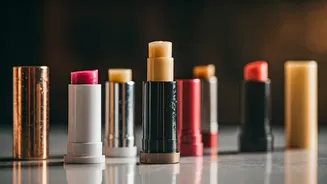Understanding Winter Lip
Winter's cold, dry air drastically affects our lips, leading to moisture loss and subsequent chapping. This happens because the skin on our lips is thinner
and lacks oil glands, making it vulnerable to dehydration. Furthermore, wind and indoor heating exacerbate the problem, drawing away even more moisture. Symptoms range from mild dryness to painful cracks, making everyday activities uncomfortable. Recognizing these factors is the initial move in effectively addressing and caring for lips during the colder months. Effective lip care involves understanding these triggers and implementing a targeted approach to protect and restore the lips' natural moisture barrier.
Balm 1: The Hydrator
This first balm is formulated with ingredients known for their intense moisturizing capabilities. It's often enriched with shea butter, a natural emollient that deeply hydrates and softens the lips, forming a protective barrier against external elements. Additionally, the balm may contain hyaluronic acid, a humectant that draws moisture from the air and locks it into the skin. This combination is particularly beneficial for severely chapped lips, providing immediate relief and long-lasting hydration. Application should be frequent, especially before bed and before going out in cold conditions. This balm is typically fragrance-free and gentle, making it appropriate for sensitive skin.
Balm 2: Sun Protection
For those spending time outdoors, a lip balm with sun protection factor (SPF) is crucial, even during winter. The sun's rays can damage the thin skin on your lips, contributing to dryness and chapping. Look for balms that offer a broad-spectrum SPF of 15 or higher. These often include ingredients like zinc oxide or titanium dioxide, which physically block the sun's rays. In addition to sun protection, these balms usually contain moisturizing ingredients such as vitamin E and various oils that condition and heal the lips. Applying this type of balm before venturing out and reapplication every two hours, particularly during midday, is important to ensure continual protection.
Balm 3: Natural Oils
Natural oils, like coconut oil, almond oil, and jojoba oil, are excellent ingredients for lip balms because of their moisturizing properties. These oils mimic the skin's natural lipids, quickly penetrating to hydrate and soften. Coconut oil is well-loved for its soothing qualities and subtle scent, while almond oil has vitamins that support skin health. Jojoba oil is praised for its similarity to the skin's natural sebum, making it a well-tolerated and effective moisturizer. A balm containing these natural oils offers a straightforward approach to lip care. Regularly applying these balms helps to restore the lipid barrier, trapping moisture and defending against dryness, especially during weather extremes. Look for balms with a high concentration of these oils.
Balm 4: The Healer
If you're dealing with cracked or damaged lips, a balm with healing properties is your best bet. Ingredients such as petrolatum, which creates a protective barrier, and allantoin, known for its ability to promote skin repair, are frequently included. Furthermore, balms may have extracts of calendula or chamomile, both known for their soothing and anti-inflammatory properties, promoting quicker healing. Frequent application of these balms assists in keeping the lips hydrated and allows the healing components to effectively work on the damaged areas. This balm type focuses on restoring the lip's natural health.
Balm 5: Vitamin Boost
Vitamin-enriched lip balms provide added benefits for the lips' overall health. Vitamin E is a potent antioxidant that shields the lips from environmental harm and aids in healing, while Vitamin C may brighten and support collagen production. These balms usually have other ingredients that hydrate the skin. Incorporating a balm rich in vitamins into your daily regimen not only hydrates but also helps prevent further damage, keeping your lips healthy and vibrant. Using these balms daily, especially in harsh conditions, can maintain the health of your lips.
Balm 6: Exfoliating Action
Dead skin cells can build up on the lips, contributing to a rough texture and hindering the effectiveness of lip balms. Exfoliating lip balms, which typically contain gentle exfoliants such as sugar or fine beads, help to remove this buildup, leading to smoother and softer lips. These formulas also often have nourishing oils and moisturizers to ensure the lips remain hydrated during and after exfoliation. Use these balms a couple of times per week. Gently massage the balm onto your lips in a circular motion to remove dead skin. This step creates a smoother surface, allowing your regular balms to absorb more efficiently.
Balm 7: Evening Routine
Overnight lip care is essential for promoting healing and maintaining moisture levels. Before bed, apply a rich, thick lip balm that forms a strong protective barrier. Some balms are specifically formulated for nighttime use and contain ingredients like ceramides, which help repair the skin's natural barrier, or beeswax, which seals in moisture. For even more intensive care, consider applying a thin layer of a balm and topping it with a thicker, occlusive ointment to maximize moisture retention. This evening ritual lets the balm work overnight to ensure lips are soft, smooth, and ready for the next day. Regularity is key to obtaining lasting results.
Balm 8: Staying Hydrated
Drinking adequate water is a fundamental element in maintaining hydrated lips. Dehydration can exacerbate dryness and chapping, so maintaining consistent hydration from the inside out is crucial. Accompany your lip balm regimen with a constant intake of water throughout the day. Consider carrying a reusable water bottle and sipping from it regularly. In addition to drinking water, you can also support your lip health by avoiding harsh soaps and cosmetic products, avoiding lip-licking, and preventing prolonged exposure to cold winds. Maintaining a balanced approach, with both internal hydration and external care, will give you the best outcomes for soft, healthy lips all winter.













